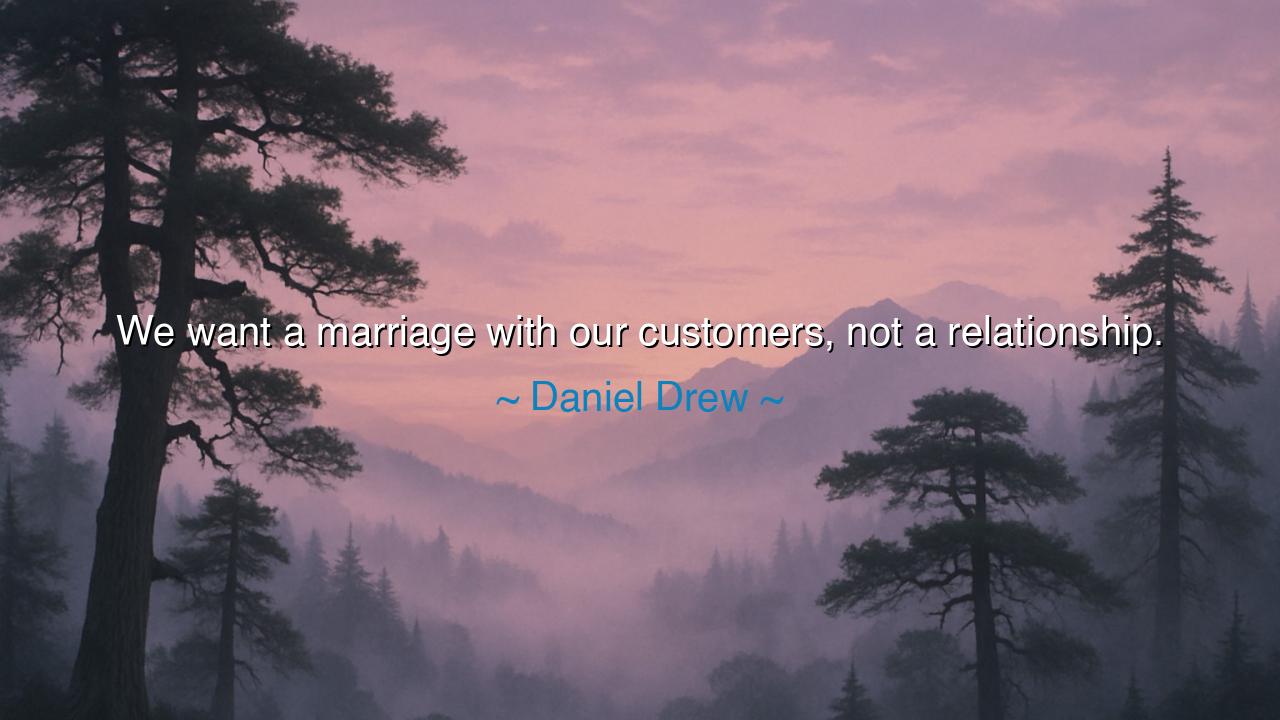
We want a marriage with our customers, not a relationship.






When Daniel Drew declared, “We want a marriage with our customers, not a relationship,” he was not speaking of romance, but of commitment, trust, and endurance—the same virtues that form the foundation of any great union. In his words lies a truth that transcends business and commerce: that lasting success, whether in trade, friendship, or life itself, is born not from fleeting attraction, but from devotion. Drew’s statement reveals the wisdom of one who understood that prosperity is not built upon transactions, but upon bonds that endure the tests of time.
The meaning of his quote rests upon the contrast between a relationship and a marriage. A relationship can be light, convenient, and transient—held together only so long as mutual benefit remains. But a marriage is something far greater: it is a pledge of loyalty even when times grow hard, a covenant that demands patience, sacrifice, and mutual growth. Drew’s vision was not to charm customers for a season, but to bind them for a lifetime—to make his business a partner rather than a seller, a companion rather than a merchant. In his eyes, the highest form of commerce was not the exchange of money, but the exchange of faith.
This philosophy, though spoken in the language of business, mirrors the wisdom of the ancients, who taught that every lasting endeavor must be rooted in integrity. The merchant who sees his buyer as a soul to serve rather than a source of profit will never lack for prosperity. The farmer who tends his field as if it were a friend will never hunger. The leader who treats his people as family will never lead in vain. So too, Drew understood that the secret to success lies in creating unity, not exploitation—in seeing commerce as a partnership of spirits rather than a contest of advantage.
History offers us many examples of this truth. Consider the legacy of John Cadbury, founder of the famed chocolate company in 19th-century England. Cadbury did not see his customers as numbers, nor his workers as tools; he saw them as part of a greater household. He built homes for his employees, provided them with education, and created a company rooted in care and morality. His customers, sensing that sincerity, rewarded him with unwavering loyalty that lasted for generations. His approach, like Drew’s words, was built on marriage, not on convenience—a covenant of trust between business and humanity. From that trust came both profit and peace.
In another light, Drew’s words serve as a warning to our modern age, where too many seek quick gains without planting deep roots. Companies rise and fall like passing storms because they build only relationships—temporary connections based on novelty and price. But a marriage with the customer—one forged through honesty, service, and mutual respect—becomes unbreakable. When trust is earned, competition loses its teeth; when loyalty is nourished, markets become communities. Drew’s insight reminds us that in every realm of life, the heart must be stronger than the contract.
On a deeper level, his quote can be seen as a parable of human interaction itself. Whether in friendship, family, or faith, the difference between a shallow bond and a lasting one is the willingness to remain when it is no longer easy. Just as a marriage survives not through constant pleasure but through shared endurance, so too must every worthy bond—between individuals or institutions—be strengthened by trials. Drew’s wisdom, though born in the world of trade, touches upon the divine art of steadfastness, the virtue that transforms fleeting affection into eternal alliance.
The lesson, then, is clear: in all things—love, work, and service—seek marriage, not mere connection. Build bonds that last, not arrangements that fade. Be loyal when others are fickle, honest when others deceive, generous when others grasp. Treat every partnership as sacred, for in doing so you will find a wealth that no coin can measure: the trust of hearts and the peace of conscience. The ancients would say, “The tree that endures the storm is the one whose roots go deep.” So too, the business, the friendship, the life that endures is the one founded upon commitment, not convenience.
Thus, Daniel Drew’s words are not merely the creed of a businessman—they are the counsel of a sage. To desire a “marriage with customers” is to desire something noble: a bond of mutual flourishing, of shared respect, of loyalty that defies the passing winds of greed. It is a reminder that all great works—be they of love, of art, or of trade—require the same virtue: faithfulness. And where faithfulness dwells, there is greatness—unshaken, enduring, eternal.






AAdministratorAdministrator
Welcome, honored guests. Please leave a comment, we will respond soon